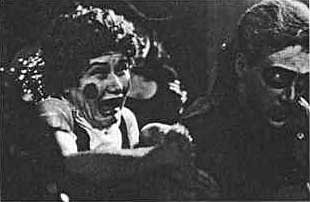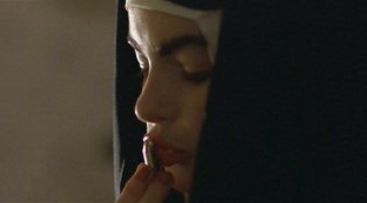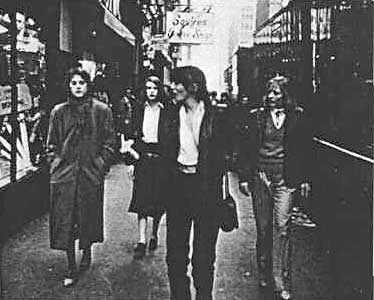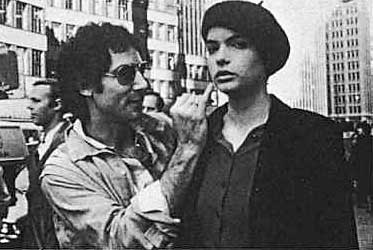Cult Movies 2
Danny Peary
MS .45
also known as Angel of Vengeance
1981 – Rochelle Films release of a Navaron Film production
Director: Abel Ferrara
Executive Producer: Rochelle Weisberg
Screenplay: Nicholas St. John
Cinematography: James Momel
Music: Joe Delia
Editor: Christopher Andrews
Running time: 84 minutes
Cast: Zoë Tamerlis (Thana), Steve Singer (photographer), Jack Thibeau (man in bar), Peter Yellen (second rapist), Darlene Stuto (Laurie), Editta Sherman (landlady), Albert Sinkys (Albert), Jimmy Laine[*] (first rapist), Bogey (Phil)
Synopsis: Thana works as a seamstress in New York's garment district. She is friends with Laurie and two other female coworkers, but lives a lonely existence in a small apartment in Clinton Gardens. She doesn't enjoy her job because her boss Albert always is yelling at his female employees or is acting patronizingly toward her. Each day the four women must march past men who line the streets and fling obscene remarks at them. Laurie protests vehemently, but Thana must remain silent because she is a mute.
Returning from work one night, Thana is raped in an alley. She stumbles into her apartment. It is being robbed. The thief rapes her. She grabs her iron and smacks him on the head. She kills him and places him in the bathtub. The next day, she cuts his body up into little pieces, which she places in bags. She puts the bags in the refrigerator and gets rid of them one by one throughout New York. The newspapers begin reporting the discovery of parts of an unknown body. When a man retrieves one of Thana's bags and without examining the contents goes after her to return it, Thana runs away. He catches up to her in an alley. She turns and fires the gun she took off the dead rapist. The man falls dead. Thana has trouble concentrating. At home, her nosy landlady and her yapping runt of a dog, Phil, get on her nerves. She gives Phil some of the rapist's body to eat. At work, her boss complains that she's not making her best effort. He wants her to come to the office's costume party. She tells him she'll let him know. The four seamstresses eat lunch at a hamburger joint. A man and woman neck nearby. When the woman leaves, the cocky man tries to flirt with the four women. Laurie tells him "Fuck off" and he backs away. But when Thana is alone, he coaxes her to come back to his beautiful studio. As soon as they enter what turns out to be a cheap studio, Thana shoots and kills him. At night, Thana dresses like a hooker and goes out. She kills a pimp who is beating a prostitute. She goes into Central Park. Gang members surround her as she wanted them to. She shoots them all down. A sheik picks her up. She kills him and his chauffeur. She meets an unhappy man. Her gun misfires. He places it against his own head and kills himself.
Thana continues to dispose of parts of the rapist's body. She gets annoyed at Phil's barking and sniffing and takes him for a walk. She ties him to a post near the East River.
Thana goes to the costume party. The landlady enters her apartment and finds a head. She calls the police. Thana wears a nun's habit, boots, and much lipstick. Albert flirts with her. When he crawls under her habit, he spots the .45 in her corset. She kills him. Thana begins to shoot all the men at the party. Laurie stops her by fatally stabbing her in the back. Thana screams, the only time anyone has heard her utter a sound. She points her gun at Laurie, who backs up in terror. But Thana does not wish to harm her.
The landlady mourns for her missing dog. But Phil is not dead. He runs up the stairs and scratches at the door.
|
|
|
Thana walks behind her fellow workers as they pass men on the street who barrage them with lewd remarks. Laurie, in front, yells back at them. Zoë Tamerlis told me: "At first Thana has admiration for Laurie, but later she feels contempt. Laurie talks a lot but she's hypocritical. Thana can't talk, she can't bullshit. Her only way to respond is through action, which is more honest." |
I caught up with Ms .45 about a year after its release, when it had received fine reviews, and a few months after it played briefly as a Midnight Movie. It was second-billed to Amin: The Rise and Fall (1982) at a sleazy 42nd Street theater, not far from the garment district where Thana is employed. For the uninitiated: the legendary 42nd Street theaters, in which so many film fanatics grew up, have so deteriorated that with the exception of diehard movie buffs the only people who dare enter the darkness are pimps, pushers, alcoholics, addicts, and assorted degenerates who want to get off their feet or elude the police for a couple of hours. In the non-porno theaters, the fare of the day is bloody horror, kung fu, and sex and strong violence pictures because with such a dangerous clientele (almost exclusively men sitting alone), theater owners know better than to risk showing a dull film. (Hermann Hesse adaptations never play 42nd Street.) When not yelling at each other, the men excitedly talk back to the screen, cheering brutality (as was the case with Amin) and, misogynists all, directing lewd comments at every female character. Predictably, when Thana is being raped at the beginning of Ms .45, an unsympathetic soul cackled: "How does it feel, baby?" I would guess that the feminists who attacked this film -- some feminist critics voiced support -- were angry with the male filmmakers for subjecting Thana to rape, not once but twice, and filming these scenes in such a way, with a gun in the frame, that violent men would want to identify with the rapist. But something fascinating happens. Once these men identify with the rapist, the filmmakers have Thana conk him on the head with an iron and kill him. Then she chops him up into little slabs and stores his parts in the refrigerator. Unexpectedly, the men who had whooped all through Amin and the obscenely gory previews of Dr. Butcher (1982), whimpered worrisomely "Oh, my God" and slumped in their seats and shut up. Never has a 42nd Street theater been so quiet and disciplined as when Thana went through her rounds and murdered every offensive male who crossed her path. Had the men in this audience witnessed their own possible fates if they continued to relate to women as they did? Certainly they could all identify with the foul-mouthed men Thana and her female coworkers must pass between each day in the garment district as if they were walking the gauntlet; could they also see themselves as the pimps, gang members, and pickup artists that Thana does in? The criminal element could enjoy such grotesqueries as The Last House on the Left (1973), in which two teen-age girls are kidnapped and tortured, and Maniac (1981), in which a psychopath scalps his female victims, but Ms .45's director Abel Ferrara and screenwriter Nicholas St. John didn't want to satisfy the sick men in the audience -- they wanted to chastise them for being so revolting toward women and to scare them off. In an early scene, Thana starts to unbutton her blouse. Experts of exploitation films expect her to unbutton it all the way, look at her nude image in the mirror for a while, and then take a shower so men can get an eyeful. At the 42nd Street theater I could sense the anticipation. But just as Thana is about to disrobe, an imaginary hand shoots under her blouse, accompanied by a frightening blast of music, and the rapist's cadaver suddenly appears behind her. It is a shocking scene -- Thana stops disrobing -- and has a strange effect on the audience: the men worry that if she starts to strip again, they will end up being scared again; consequently, they'd rather have Thana keep on her clothes and do without nudity. So in a way, Ms .45 works as an odd form of therapy.
|
|
|
Thana allows a photographer to pick her up so she can kill him. Tamerlis: "Laurie told off the photographer, but he went after Thana anyway. But after Thana finishes with him, he'll not go after anyone else." |
In a recent interview, Ferrara told me that "There was no conscious decision not to have nudity in the film. Zoë Tamerlis was willing to do it. It was just a flash decision to not have it. We were aiming at a cold sexuality, a violent tone. Roman Polanski is an influence on all my work." While Ferrara points to Polanski's Macbeth (1971) as the film which most influenced the tone of his first two films, Driller Killer (1379) and Ms .45, the plot and thematic elements of Ms .45 seem patterned after Polanski's Repulsion (1965).
Catherine Deneuve is another beautiful, sexually confused young woman. While Thana works in a subordinate position as a seamstress, Deneuve is a beautician's aide. Both suffer sexual harassment going to and coming from work. Both kill men who force themselves on them sexually. While corpses rot in their apartments, both continue to go to work for a time, both lapse into a temporary shock state while at work, both begin missing work. Like most Polanski characters, Deneuve and Thana both are subjected to meddling neighbors (and their dogs) that intrude on their privacy and their thinking -- in Driller Killer, the maniac finally goes off the deep end when a loud punk-rock group moves into his building. The two women become increasingly isolated, but they go in different directions: Deneuve becomes paranoid and kills all men who come after her in her apartment; Thana breaks free of her initial paranoia and goes out into the city after men before they have the chance to come after her. Deneuve goes crazy -- but Thana, though acting "crazy," remains rational: she does not kill her lesbian friend Laurie, who has fatally stabbed her, and she does not kill her batty landlady's dog Phil, despite how much he annoys her. "The public had a lot of trouble with the character," says Ferrara. "Thana isn't clearly defined. At times I think her sympathetic, and at other times, fascistic. It shook up people to see an innocent person like themselves suddenly become a wanton murderer." Since many people loved the vigilante-justice character played by Charles Bronson in Death Wish (1974) -- which professes that it's okay to kill scum -- it's a relief that these exploitation filmmakers created a vigilante who, despite having sympathetic motivation for her actions, scares the living daylights out of all of us.
 |
|
Halloween party victims of Thana's shooting spree. She shoots only men. According to Saul Shiffrin, whose Rumson Films now distributes Ms .45, he has trouble selling it to cable because it is too intense for the average viewer. |
The mute Thana represents all the women of the world who don't speak out against the daily outrages they are subjected to from men (bosses, boyfriends, strangers): a constant barrage of come-ons, orders, insults, patronizing conversation. "I just wish they would leave me alone," she writes, but she hasn't the nerve or the capacity to tell men to "Fuck off" like the brave Laurie. She is the passive female -- her job is sewing -- who kills a man with an iron, symbol of the stereotypical unliberated woman, signifying that woman's passivity is not insurmountable. She picks up the rapist's gun (obviously a phallic symbol) -- she will use their weapon to destroy them. Thana, who had been the epitome of the desperate, faceless lone woman in New York, now becomes an angel of vengeance (Angel of Vengeance was the film's foreign title as distributed by Warner Bros.). As she methodically, savagely, and silently avenges her abuse, she becomes far more intriguing than other cinema women who have retaliated for their own rapes: Raquel Welch in Hannie Calder (1971) and Margaux Hemingway in Lipstick (1976), to name just two. Ferrara credits Tamerlis, then a seventeen-year-old with an otherworldly resemblance to Nastassia Kinski, Simone Simon, and Bianca Jagger, for "giving the character more complexity than there was in the script. Zoë herself is complex." And a fine actress, who, Ferrara says, is trying to make it in California after acting in films in Italy[*]. Thana never speaks, but Tamerlis gives her remarkable presence. Considering that she was a high school student who hadn't been in films previously, she is extremely composed. I'm surprised no studio scout has taken an interest in her, because as we can see when she dresses up in a nun's habit with heavy makeup, high boots, and her .45 stuck in her garter, she has astounding sex appeal.
 |
|
Two posters for Ms .45. On the left, Thana is seen shooting down gang members who surround her in a park. On the right is a poster similar to one used for a James Bond movie. Tamerlis: "While the picture had its run in New York, I was shot in the hip by a sniper while dressed similarly to Thana when she pursued victims. It was very suspicious. I like Thana a lot. I knew a lot about her that others didn't. That she came from a banal, religious background... that her handicap was psychosomatic from way back. Her dream was to be a model, but she had no hope of leaving the sweatshop. She was very innocent. She'd seen a lot but hadn't done anything. She had a conscience but not a whit of consciousness until she is raped. The film obviously is about physical rape -- but it's truly, in my more elaborate view, about anyone who's been raped or screwed over in any way. The real villain is Thana's boss, who wants to keep his women for forty years in his service. He's the one person she sets out to kill." |
What really distinguishes Ms .45, in addition to Tamerlis's fine performance, is the gifted direction by Abel Ferrara. Foremost, the picture is highly stylized. Witness the bizarre costume party massacre scene filmed in slow motion; it is truly surrealistic. Ferrara often uses a wide-angle lens to good effect ("I like using the wide angle when I film on location"); particularly impressive is the scene in which the guy chases Thana down the alley and runs toward the camera, which distorts his image at the precise moment Thana's bullet smashes him in the skull and sends him reeling over backward. I also like the scene in which Thana studies herself in the mirror and keeps pretending to shoot in different directions: it is downright eerie seeing her dressed in the habit, wearing lipstick, and acting like a cowboy or Belmondo's gangster in Breathless (1961) (as he drives along and aims his finger and makes shooting noises) while Ferrara uses slow motion and adds a sproingy noise on the soundtrack. I'm also impressed by the way Ferrara incorporates his music. He uses horns and drums, not just a synthesizer, which is utilized in many low-budget films. Thus the music adds to the feel of the film (and the New York City locales), i.e, the pulsating, heartbeat music before Thana shoots the photographer in his heart; the sleazy music (sax riffs) when Thana dresses like a hooker to go hunting for pimps and gang members; the blaring sound as Thana does away with the sheik and his chauffeur.
 |
|
Dressed as a nun, Thana blesses the bullets she'll use to kill men. Tamerlis: "lt's a paradox: she's a 'crafty Christ' dressing as she does. That's what a revolutionary person has to be." |
Ferrara inserts much humor into his morbid storyline. I also got a kick out of all Ferrara's weird characters. Of landlady Editta Sherman, The New York Times wrote, "There hasn't been a screen performance so hair-raising since Frances Faye played a madam in Pretty Baby (1978)." (In typical exploitation film fashion, the blurb the filmmakers attributed to the Times about the film as a whole was "Hair-raising!") The landlady's a great movie character, who wears a hat over long stringy gray hair and keeps pictures of both her husband and dog Phil on her mantel. All the other characters are memorable as well. Since this film was made by men, it's amazing that every male character (including Phil) is obnoxious. Even when we only get to hear them say one or two lines, we can deduce their awful personalities: one partygoer talks about paying three hundred dollars to screw a virgin; another tells his girl he's changed his mind about having a vasectomy. Put these men together in the world's power elite with boss Albert (who's always yelling at his seamstresses or putting the make on Thana), the conceited photographer (who smooches with his girl, then flirts with Thana the moment she leaves), the gang members, the sheik, the rapists, and the rude men who line the streets, and what's a girl to do?
[*] In fact, in 1981 twenty-year-old actress-playwright-composer-model Tamerlis (known as Tamara Tamarind in Europe) was busy finding resources to finish filming a 420-page script she wrote called Curfew: U.S.A., directed by Christian Edward Saint de Laurent (which she hopes will be completed for 1985's Venice Film Festival). A three-million-dollar political thriller (preliminary filming had been done in Mexico, the Caribbean, France, Italy, and the U.S.), Curfew attacks American imperialism and deals specifically with the radicalization of a liberal American actress (to be played by Tamerlis) who performs a political assassination. Tamerlis told me it is "a critique of both bourgeois feminism and America's left -- which talks but doesn't act -- told from a revolutionary perspective. Like Thana in Ms .45, actress Una Horn develops a consciousness whereby she can act on her conscience. It's the most hopeful drama of America I can conceive of."

